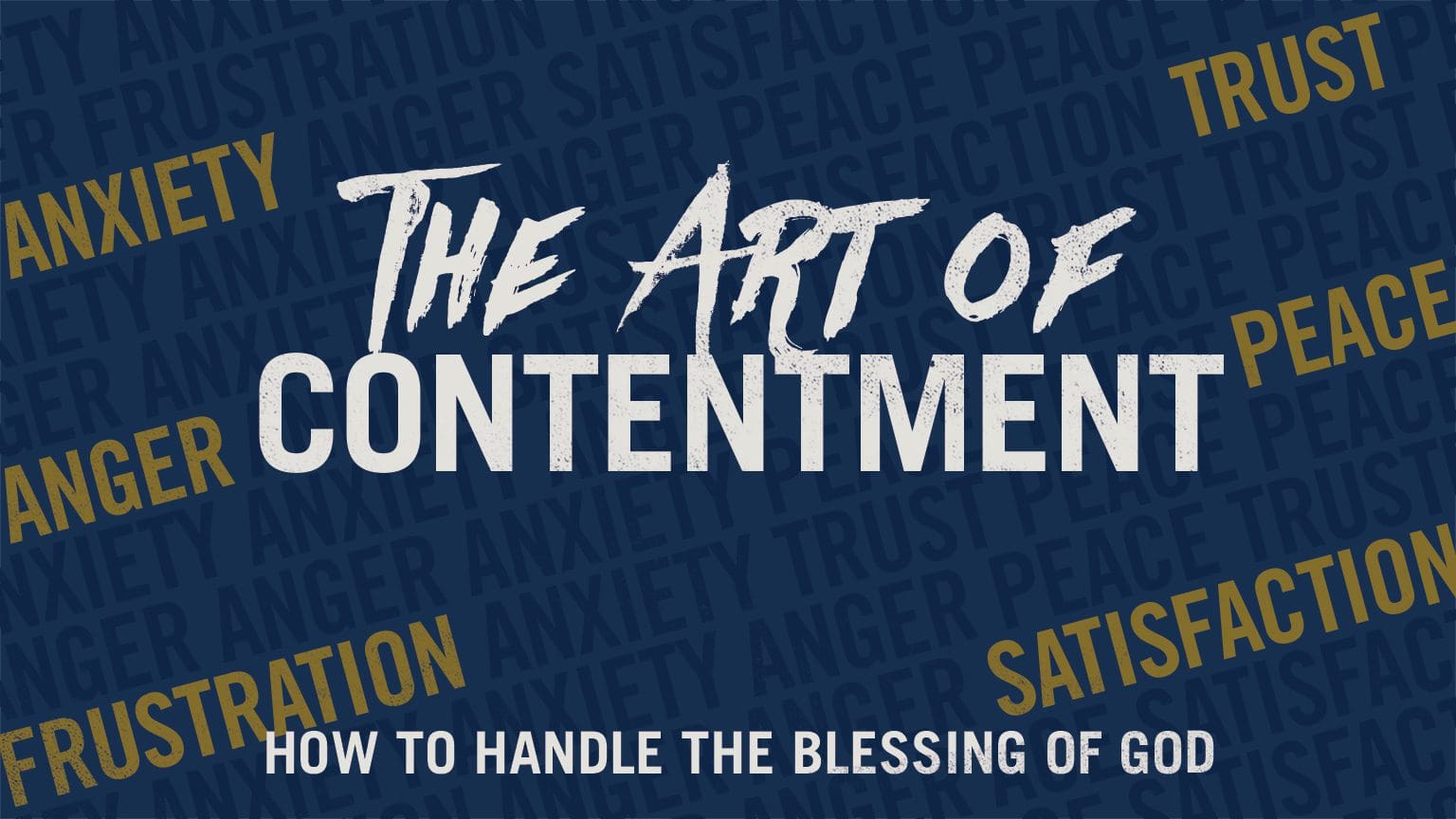Keep your life free from love of money, and be content with what you have, for he has said, “I will never leave you nor forsake you.” So we can confidently say, “The Lord is my helper; I will not fear; what can man do to me?” (Hebrews 13:5-6)
This passage is special to my wife, Karen, and I because these verses were read and preached at our wedding. It begins with the theme of love. It speaks about hospitality and caring for people in need. Then it speaks about marriage and faithfulness. And finally, it hits on our theme of contentment. You will notice that there is a command, a promise, and a response.
The Command
Keep your life free from love of money, and be content with what you have. (Heb. 13:5)
This is a direct command from the mouth of God. He does not say, “You might like to think about contentment.” Discontent is a hellish sin and God calls us to be done with it. Love of money, as we saw from 1 Timothy 6, is a root of all kinds of evil and God calls you to keep your life free from it.
Over this last month we have set our minds and our hearts to the business of obeying this clear calling and commandment of God. Keep your life free from love of money and be content with what you have. I want to offer two practical strategies for pursuing this contentment today.
You grow in contentment, not by adding to what you have, but by subtracting from what you desire. The world says that you will find contentment when your possessions rise to the level of your desires. But the Christian finds contentment, not by bringing her possessions up to her desires, but by bringing her desires down to her possessions.
Find joy in what God has given you. Someone said to me in the foyer the other week that she had just experienced what a wonderful gift contentment is. She had been visiting with a friend whose house was much larger and grander than hers and she said, “I came home and I said to myself, ‘I love the home that I have.’” That’s contentment.
You grow in contentment by making the right comparisons.
Making the wrong comparisons is a major source of discontentment in life. We look at people who have more, people who enjoy blessings that were not given to us, and we ask: “Why was that given to them and not to me?”
5 Comparisons That Help Us to Be Content
Making the right comparisons can be helpful in cultivating contentment. Thomas Watson suggests five comparisons that help us to be content.
1. Compare your condition with what you deserve.
When it comes to kindness and mercy, God has given us more than we deserve. When it comes to trouble and affliction, God has given is less than we deserve (see Ezra 9:13).
Thomas Watson, like many other puritans, was writing at a time when many pastors were being thrown into prison. How could these men, who were enduring this suffering, be content like the apostle Paul when he was in prison?
Watson uses this argument of comparing your condition with what you deserve, “Has he thrown us into prison? He might have thrown us into hell.”
2. Compare your condition with others who have less.
His point here is simple. We easily look at those who have more than we do and feel discontented. Instead we should look to those who have less and be thankful.
Am I in prison? Was not Daniel in a worse place, the lion’s den? Someone has said, “I moaned because I had no shoes, until I met a man who had no feet.”
3. Compare your condition with Christ’s on earth.
Are you unhappy with your home? “Foxes have holes, and birds of the air have nests, but the Son of Man has nowhere to lay his head” (Matt. 8:20).
Are you unhappy with your appearance? “His appearance was so marred, beyond human semblance” (Isa. 52:14).
Have your friends let you down? “All the disciples left him and fled” (Matt. 26:56).
Whenever you are facing difficulty, it will help you to see that Jesus knew more about this than you ever will.
4. Compare your condition with what it once was.
Think about your condition when you were born: Spiritually, we were “heirs apparent to hell.” Materially, we had nothing when we stepped out of the womb, “We brought nothing into the world” (1 Tim. 6:7). If we do not have what we want in this world, we certainly have a lot more than we brought into it.
5. Compare your condition with what it will be soon.
There is a time coming very soon when everything you have ever wanted in this world would be of no use to you whatsoever. When we die we must leave this world and all that is in it behind: “We brought nothing into the world, and we cannot take anything out of the world” (1 Tim. 6:7).
That is why the Scripture says, “Set your minds on things above where Christ is seated” (Col. 1:1-2, author para.). “Your life is hidden with Christ in God” (1:3). Keep your life free from love of money, at all costs, and be content with what you have.
The Promise
Keep your life free from love of money, and be content with what you have, for he has said, “I will never leave you nor forsake you.” (Heb. 13:5)
Here we have a marvelous example of gospel motivation, and I want you to see how this works. God does not say: “Keep your life free from the love of money, and be content with what you have… or else!” God ties the command to a promise.
Listen to what he says: “Keep your life free from the love of money, and be content with what you have… [because] he has said, ‘I will never leave you nor forsake you.’” The motive and the power for obeying the command lies in the promise. We obey the command by believing the promise. That’s how you live the Christian life.
What a marvelous promise this is: God says, “I will never leave you. I will never forsake you.”
To be forsaken by God would be to the worst thing imaginable. A person forsaken by God would be completely alone, completely helpless, and completely hopeless forever. To be forsaken by God would be the hell of hell itself.
God says to his people, “That will never happen to you! You will never be alone. You will never be without my help. Whatever you face, you will never be without the light of hope.
Whatever happens, I will be with you. I will never leave you, nor forsake you.”
Commentators point out that in the original language there are five negatives. You can’t translate that directly because in English a double negative is a positive. But in Greek a double negative adds emphasis, and here we have five of them all piled up on top of each other!
One commentator says, “This is perhaps the strongest negation in the Bible.” [1] I will never, never leave you. I will never, never, never forsake you. When Spurgeon preached on this verse, he chose a five world title: Never, Never, Never, Never, Never! [2]
You can trust this promise.
God has made this promise and think about who he is to you: He is the Father who loves you. He is the Son, the Savior who redeems you at the cost of laying down his life at the cross. He is the Spirit who indwells you.
When God says to you, “I will never leave you nor forsake you,” he is saying, “There will never be a time when you do not have a Father who loves you. There will never be a time when you do not have a Savior to guard you and keep you. There will never be a time when you do not have the presence and power of the Holy Spirit to sustain you.”
Christian contentment is birthed here. The Christian who takes this in will say, “Whatever happens, this remains true. God will never leave me nor forsake me, and I can live on that.”
God has made this promise. He has made it in the strongest language. He has given it to his own children. And his honor is tied to keeping it. You can be very confident in this promise.
The promise is ours because of Jesus Christ.
All of God’s promises are ‘yes’ and ‘amen’ in Christ Jesus (2 Cor. 1:20), which simply means that without Jesus Christ there would not be any promises from God for us. All of God’s promises are ours in him and because of him.
People who’ve been through a terrible experience sometimes say, “I’ve been through hell,” but that is never possible for a Christian. There is only one person who has ever truly endured hell on earth and that is Jesus: “My God, my God, why have you forsaken me?” (Mark 15:34). Christ was forsaken on the cross so that you would never know what it is like.
There may be times when you feel forsaken. There may be times when you cannot feel the light of God’s presence or the warmth of his love, but rest assured of this: In Jesus Christ you are never alone, you are never helpless, and you are never without hope: “I will never, never leave you; I will never, no never, no never forsake you.”
You can draw strength from this promise.
This is not the first time that God gave this promise in the Bible, and the times when it was given before alert us to times when we especially need to hear this promise.
1. When you are facing an overwhelming challenge.
God gave this promise to Joshua, who faced the overwhelming challenge of stepping up as the successor to Moses. Imagine the pressure of stepping into Moses’ shoes! So, God gave Joshua this promise: “Just as I was with Moses, so I will be with you. I will not leave you or forsake you. Be strong and courageous” (Josh. 1:5-6).
The promise of God’s presence is given again and again in the Scriptures when his people are facing times of trouble: “When you pass through the waters, I will be with you” (Isa. 43:2).
The presence of Christ is the Christian answer to fear. When you know that God has said, “I will never leave you,” then you will be able to say with confidence, “The Lord is my helper; I will not fear; what can man do to me?” (Heb. 13:6)
2. When you need to take a step of faith.
God gave this promise to Solomon, who was in the opposite position from Joshua. Solomon’s father, David, had established a kingdom. He had subdued his enemies and
passed on a legacy of blessing to his son.
The great temptation for Solomon was to live within his comfort zone—to play it safe, to hold back. After all, he could easily say, “Even my father, David, did not build a temple. So why should I attempt something so hard, so costly, and with so much risk?”
The Bible records David’s last words to Solomon. It includes a long list of all that David has done to gather the materials for building the temple. The detail is astonishing: “I am giving you the plans for the temple. I am giving you the gold for the lampstands, and for the table and for the forks and the cups…”
Then David said to his son, “Be strong and courageous and do it. Do not be afraid and do not be dismayed, for the Lord God, even my God, is with you. He will not leave you or forsake you, until all the work for the service of the house of the Lord is finished” (1 Chr. 28:20).
There are many times when the greatest temptation is simply to play it safe when God may be calling you to take a step of faith. And in that moment you will need to draw deeply on this promise: “I will never leave you and never forsake you.”
In his last words to his son, David says, “Solomon, you have been entrusted by me with marvelous resources. Make sure that you use them to build God’s house! Don’t settle back into a life of ease and squander it all on yourself. Venture out into all that the Lord is calling you to do. Do it! Because God is with you.”
Here’s how you can take that step of faith with confidence: God has said, “I will never leave you, I will never forsake you.”
3. When following Christ has been costly.
You had compassion on those in prison, and you joyfully accepted the plundering of your property, since you knew that you yourselves had a better possession. (Heb. 10:34)
God gave this promise to the Hebrew believers in the New Testament. Following Christ had been costly for them. The authorities had come in and confiscated their property simply because they were believers, and some were beginning to wonder if the cost was worth it. That is why there is so much in this letter about persevering and not turning back.
Since some had their property confiscated, you can see why the love of money would be an issue, and the writer says, “Keep your life free from love of money, and be content with what you have, for he has said, ‘I will never leave you nor forsake you.’” (Heb. 13:5).
As I have been preparing this, my mind goes out to many who, in different ways, have found that following Christ has been truly costly for you. There is a real and measurable loss simply because of your commitment to integrity.
Because you took a stand and were baptized as a Christian believer, you were disowned and you will not inherit what you might have. Your life could have been much easier if you have chosen a different path, but you chose to walk the path of Jesus, to take up your cross and follow him. And he says to you: “I will never, never leave you. I will never, never, never forsake you!”
The Response
He has said, “I will never leave you nor forsake you.” So we can confidently say, “The Lord is my helper; I will not fear; what can man do to me?” (Heb. 13:5-6)
You obey God’s command by believing his promise. And when you obey the command by believing the promise, it puts you in a position when you can say and know with confidence,
“The Lord is my helper; I will not fear; what can man do to me?” When you can say that, you will have learned the secret of contentment.
[1] John Brown, Epistle to the Hebrews, p. 683, Sovereign Grace Publishers, 2008.
[2] C. H. Spurgeon, from sermon #477, October 26th 1862,





